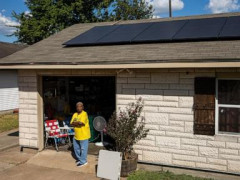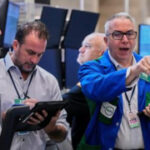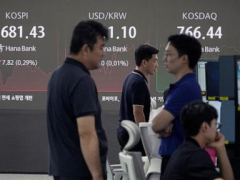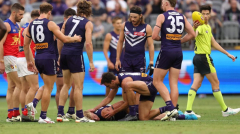HOUSTON — Doris Brown was nearly asleep when a neighbor knocked on her door, telling her to look outside. “There were no lights, nowhere,” said Brown, recalling the power outage that summer night in 2023. “I didn’t even know it.”
Brown’s solar panel and battery system was keeping her power on. She’d prepared for a night like this. “Call everybody,” she told the neighbor.
Soon around 15 “neighbors and neighbors’ neighbors” were inside Brown’s three-bedroom, 1 1/2-bath home in Northeast Houston. They charged phones, cooked, and showered before work and school. Some slept over.
“There were people sleeping everywhere,” said Brown, 75. She was happy to be “a port in a storm,” despite one downside: “They ate all my snacks.”
Brown’s house is a “hub home,” one of seven in a Northeast Houston pilot program meant to create emergency safe havens — not at shelters or community centers, but inside neighbors’ houses.
The idea was a grassroots response to decades of community disinvestment and neglect that got neighbors talking about what they could do to be ready for extreme weather and power outages.
“It’s us helping us,” said Brown.
The project was set to reach 30 more homes, until the Environmental Protection Agency in August canceled the $7 billion Solar for All program which would have funded its expansion. Harris County, which includes Houston, is now a plaintiff in one of multiple lawsuits over the cancellation.
People involved with the program acknowledge hub homes are unconventional — requiring trust and community cooperation and impacting fewer people than a larger resilience center.
But they also say they’re effective in creating pockets of preparedness in communities confronting more extreme weather but lacking resources to do more.
“It was a way to increase resilience in those neighborhoods that are often forgotten,” said Sam Silerio, Texas program director at Solar United Neighbors, one of the nonprofits involved with the pilot program which is also suing over the cuts.
The hub homes idea started after Winter Storm Uri in 2021, when freezing temperatures crippled Texas’ power grid for five days and led to 246 storm-related deaths, according to the Texas Department of Health Services.
Power loss contributed to many of the deaths, as people with health conditions couldn’t refrigerate medicines or run life-sustaining medical devices. Nineteen people died from carbon monoxide poisoning from improperly using generators and grills to stay warm.
“We were like, ‘Shoot, power grid failure is a serious thing that we are not prepared for’,” said Becky Selle, co-director of disaster preparedness, organizing, and operations at West Street Recovery, a Northeast Houston nonprofit founded after Hurricane Harvey in 2017.
WSR bought some generators for residents willing to share the resource. Brown, who almost froze to death herself in Uri, stepped up.
WSR added more supplies to the hubs, like life jackets and kayaks for flood evacuations, and held preparedness trainings for members.
When the D.C.-based nonprofit Solar United Neighbors approached them with a private grant from the Hive Fund to add free solar panels and batteries to several houses, WSR knew exactly where to install them.
The pilot had its challenges — some roofs had to be repaired before they could hold so





